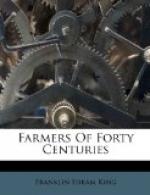So far as may be judged from the success of the most thorough sanitary measures thus far instituted, and taking into consideration the inherent difficulties which must increase enormously with increasing populations, it appears inevitable that modern methods must ultimately fail in sanitary efficiency and that absolute safety must be secured in some manner having the equivalent effect of boiling water, long ago adopted by the Mongolian races, and which destroys active disease germs at the latest moment before using. And it must not be overlooked that the boiling of drinking water in China and Japan has been demanded quite as much because of congested rural populations as to guard against such dangers in large cities, while as yet our sanitary engineers have dealt only with the urban phases of this most vital problem and chiefly, too, thus far, only where it has been possible to procure the water supply in comparatively unpopulated hill lands. But such opportunities cannot remain available indefinitely, any more than they did in China and Japan, and already typhoid epidemics break out in our large cities and citizens are advised to boil their drinking water.
If tea drinking in the family is to remain general in most portions of the world, and especially if it shall increase in proportion to population, there is great industrial and commercial promise for China, Korea and Japan in their tea industry if they will develop tea culture still further over the extensive and still unused flanks of the hill lands; improve their cultural methods; their manufacture; and develop their export trade. They have the best of climatic and soil conditions and people sufficiently capable of enormously expanding the industry. Both improvement and expansion of methods along all essential lines, are needed, enabling them to put upon the market pure teas of thoroughly uniform grades of guaranteed quality, and with these the maintenance of an international code of rigid ethics which shall secure to all concerned a square deal and a fair division of the profits.
The production of rice, silk and tea are three industries which these nations are preeminently circumstanced and qualified to economically develop and maintain. Other nations may better specialize along other lines which fitness determines, and the time is coming when maximum production at minimum cost as the result of clean robust living that in every way is worth while, will determine lines of social progress and of international relations. With the vital awakening to the possibility of and necessity for world peace, it must be recognized that this can be nothing less than universal, industrial, commercial, intellectual and religious, in addition to making impossible forever the bloody carnage that has ravaged the world through all the centuries.




